Reentry Myth Busters
Topics:
Correctional Education
Criminal and Juvenile Records
Employment
Family Engagement
Health Policy
Housing
Mental Health

The Reentry Myth Busters are a series of fact sheets created by the partner agencies within the Federal Interagency Reentry Council's (FIRC) and intended to clarify existing federal policies that affect individuals who were formerly incarcerated and their families. Each year, more than 600,000 individuals are released from state and federal prisons. Another 9 million cycle through local jails. When reentry fails, the social and economic costs are high—more crime, more victims, more family distress, and more pressure on alreadystrained federal, state, and municipal budgets.
Because reentry intersects with health and housing, education and employment, family, faith, and community well-being, many federal agencies are focusing on initiatives for the reentry population. Under the auspices of the FIRC, federal agencies are working together to enhance community safety and well-being, assist those returning from prison and jail in becoming productive citizens, and save taxpayer dollars by lowering the direct and collateral costs of incarceration.
Myth Busters are available for the topics below or can be downloaded all together as one document (PDF).
Employment, Income, and Taxes
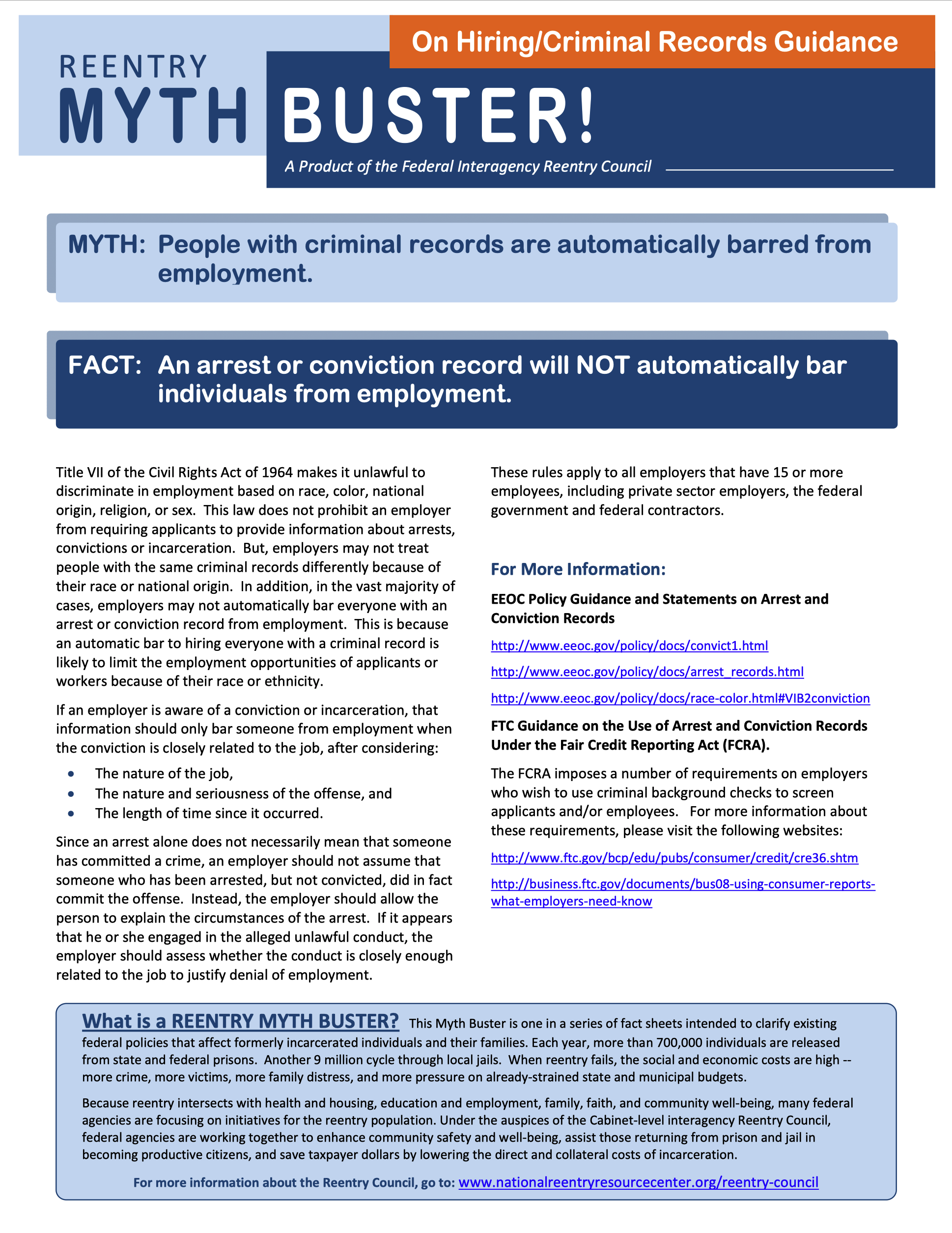 Myth Buster on Hiring/Criminal Records Guidance (PDF)
Myth Buster on Hiring/Criminal Records Guidance (PDF)
Myth: People with criminal records are automatically barred from employment.
Fact: An arrest or conviction record will NOT automatically bar individuals from employment.
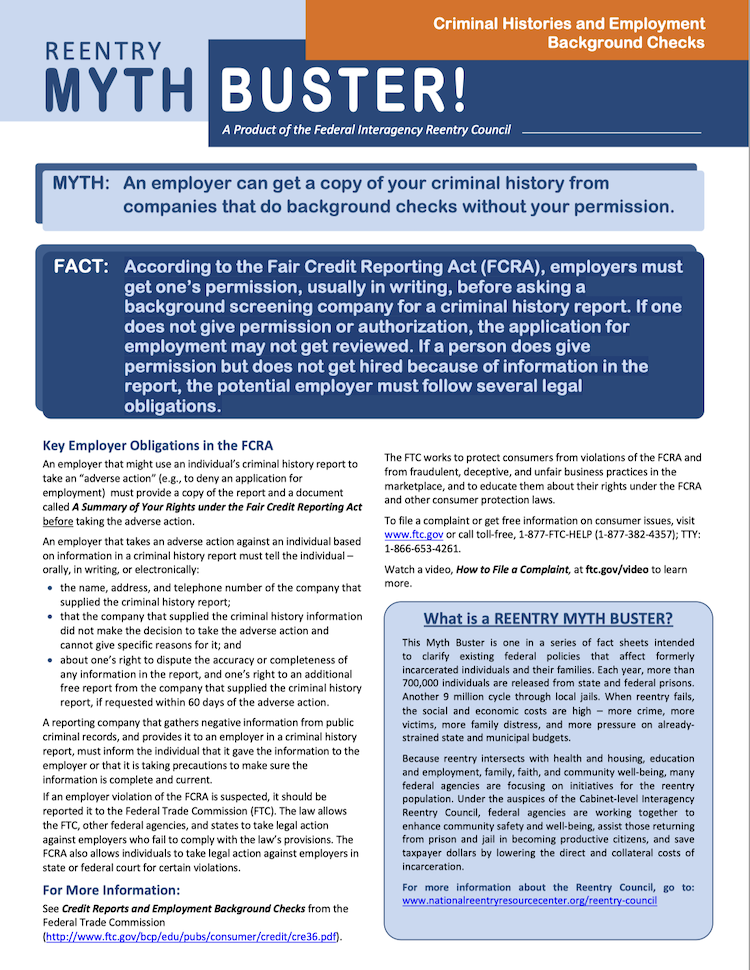 Myth Buster on Criminal Histories and Employment Background Checks (PDF)
Myth Buster on Criminal Histories and Employment Background Checks (PDF)
Myth: An employer can get a copy of your criminal history from companies that do background checks without your permission.
Fact: According to the Fair Credit Reporting Act (FCRA), employers must get one’s permission, usually in writing, before asking a background screening company for a criminal history report. If one does not give permission or authorization, the application for employment may not get reviewed. If a person does give permission but does not get hired because of information in the report, the potential employer must follow several legal obligations.
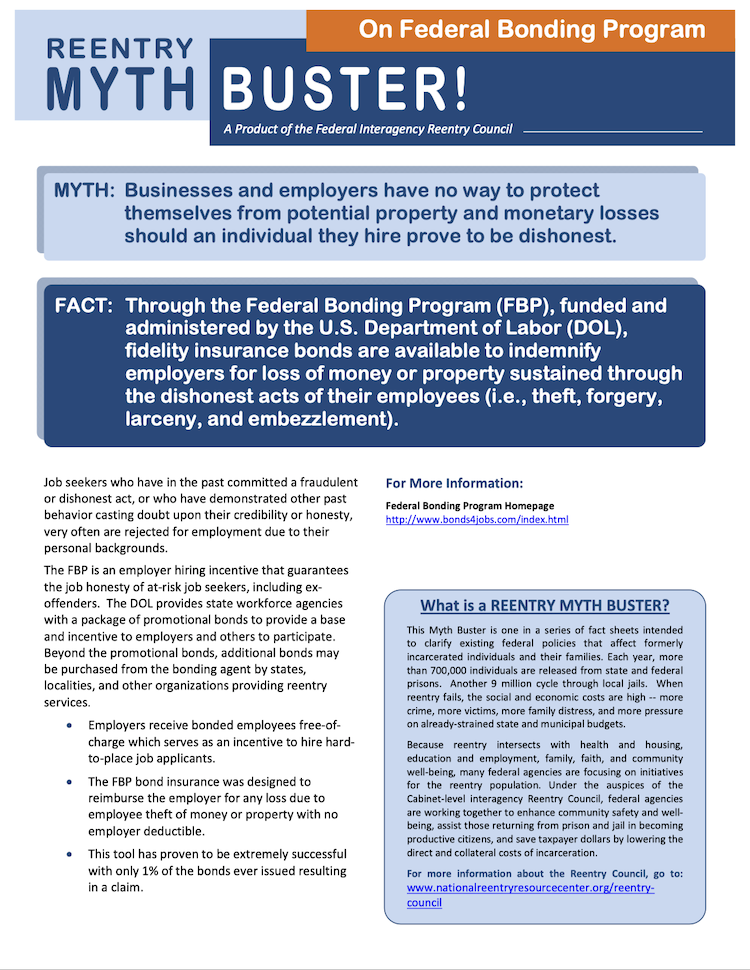 Myth Buster on Federal Bonding Program (PDF)
Myth Buster on Federal Bonding Program (PDF)
Myth: Businesses and employers have no way to protect themselves from potential property and monetary losses should an individual they hire prove to be dishonest.
Fact: Through the Federal Bonding Program (FBP), funded and administered by the U.S. Department of Labor (DOL), fidelity insurance bonds are available to indemnify employers for loss of money or property sustained through the dishonest acts of their employees (i.e., theft, forgery, larceny, and embezzlement).
 Myth Buster on Federal Hiring Policies (PDF)
Myth Buster on Federal Hiring Policies (PDF)
Myth: The Federal Government’s hiring policies prohibit employment of people with criminal records.
Fact: The Federal Government does not have a policy that precludes employment of people with criminal records from all positions.
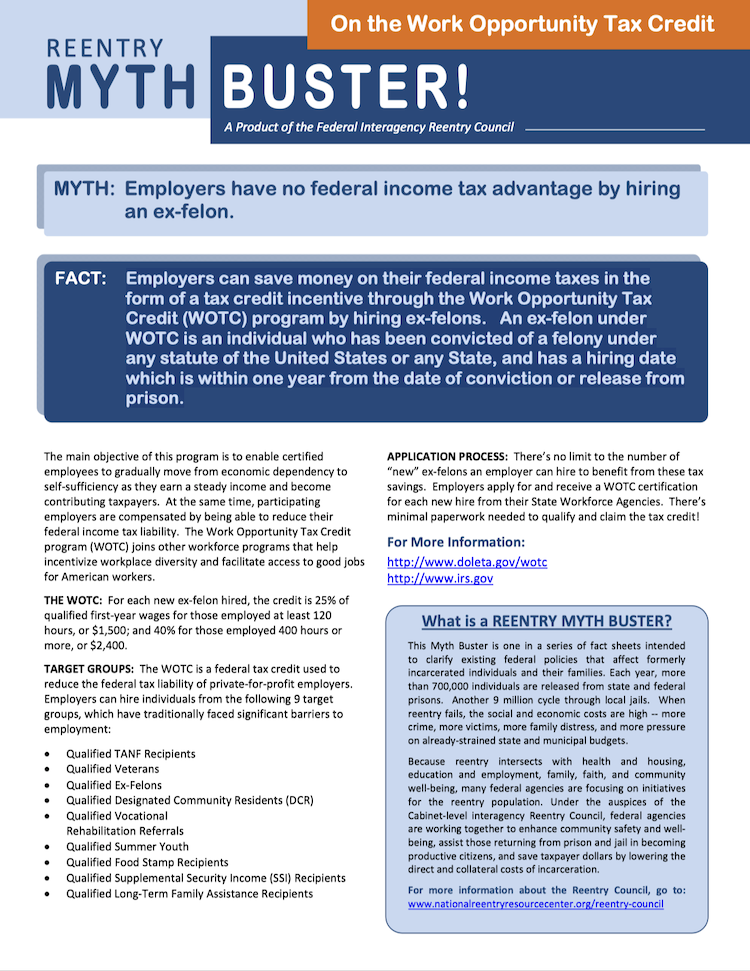 Myth Buster on the Work Opportunity Tax Credit (PDF)
Myth Buster on the Work Opportunity Tax Credit (PDF)
Myth: Employers have no federal income tax advantage by hiring an ex-felon.
Fact: Employers can save money on their federal income taxes in the form of a tax credit incentive through the Work Opportunity Tax Credit (WOTC) program by hiring ex-felons. An ex-felon under WOTC is an individual who has been convicted of a felony under any statute of the United States or any State, and has a hiring date which is within one year from the date of conviction or release from prison.
 Myth Buster on Social Security Benefits (PDF)
Myth Buster on Social Security Benefits (PDF)
Myth: Eligibility for Social Security benefits cannot be reinstated when an individual is released from incarceration.
Fact: Social Security benefits are not payable if an individual is convicted of a criminal offense and confined. However, monthly benefits usually can be reinstated after a period of incarceration by contacting Social Security and providing proof of release.
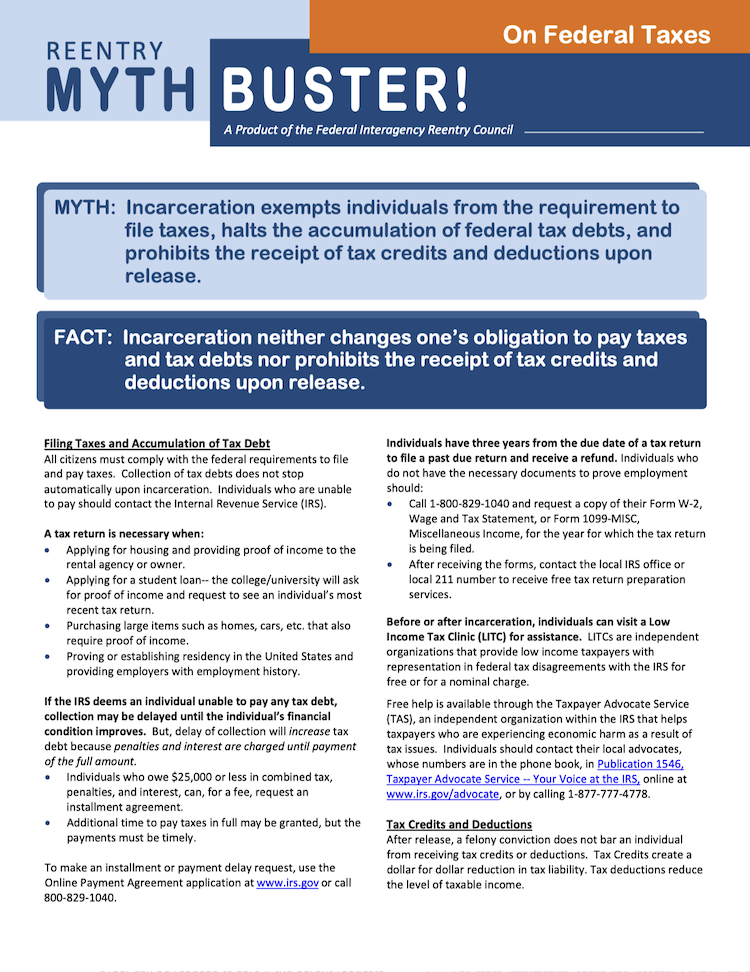 Myth Buster on Federal Taxes (PDF)
Myth Buster on Federal Taxes (PDF)
Myth: Incarceration exempts individuals from the requirement to file taxes, halts the accumulation of federal tax debts, and prohibits the receipt of tax credits and deductions upon release.
Fact: Incarceration neither changes one’s obligation to pay taxes and tax debts nor prohibits the receipt of tax credits and deductions upon release.
Voting Rights
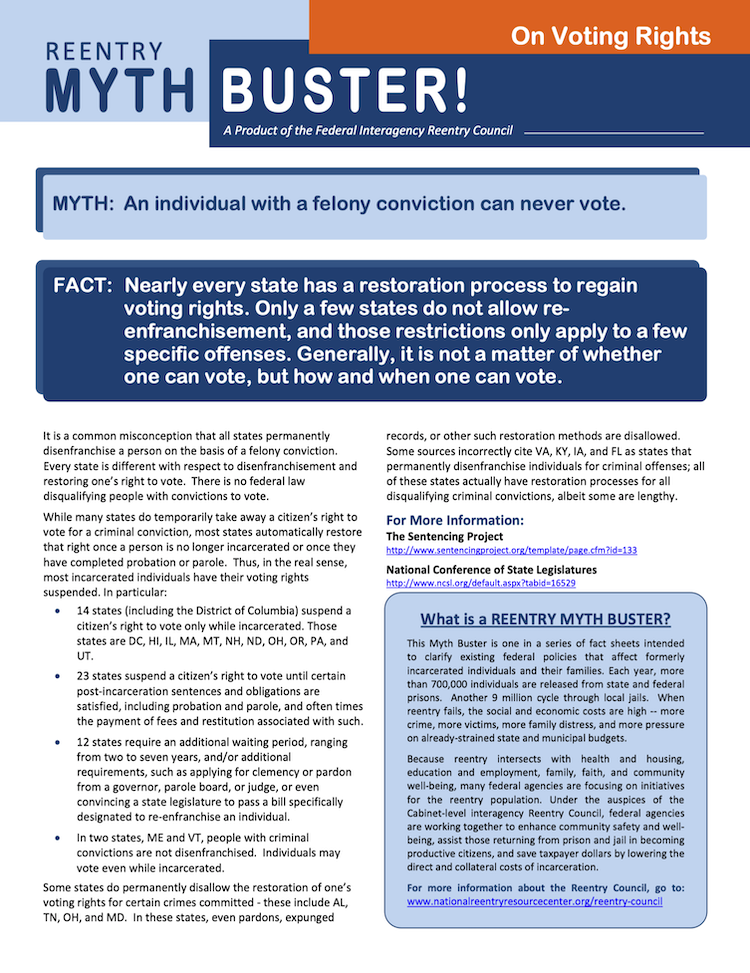 Myth Buster on Voting Rights (PDF)
Myth Buster on Voting Rights (PDF)
Myth: An individual with a felony conviction can never vote.
Fact: Nearly every state has a restoration process to regain voting rights. Only a few states do not allow reenfranchisement, and those restrictions only apply to a few specific offenses. Generally, it is not a matter of whether one can vote, but how and when one can vote.
Housing
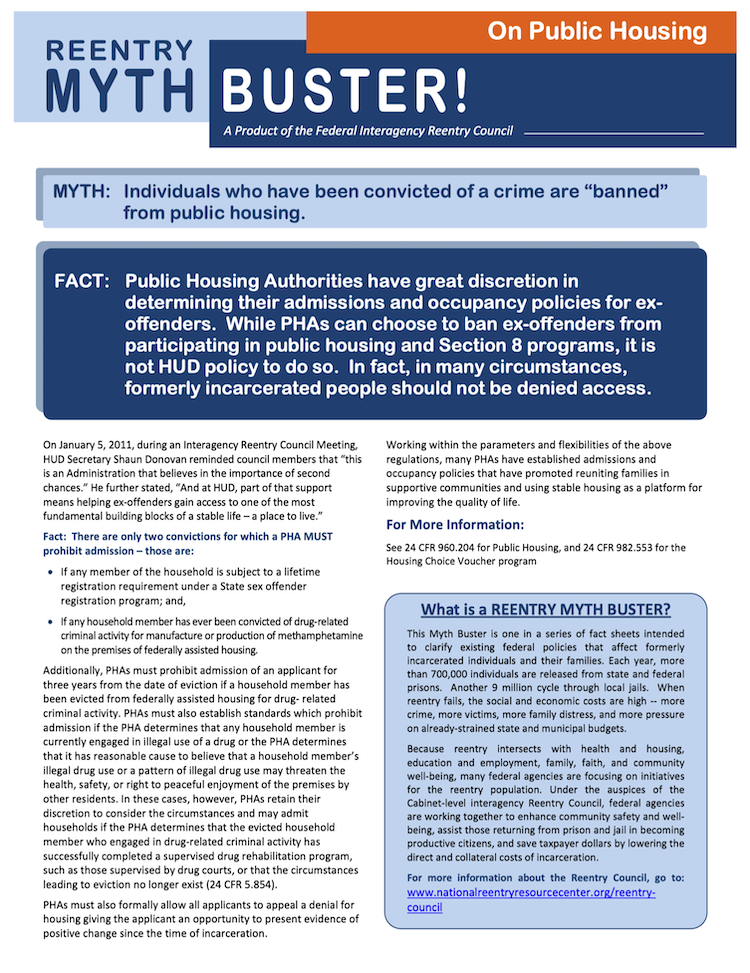 Myth Buster on Public Housing (PDF)
Myth Buster on Public Housing (PDF)
Myth: Individuals who have been convicted of a crime are “banned” from public housing.
Fact: Public Housing Authorities have great discretion in determining their admissions and occupancy policies for exoffenders. While PHAs can choose to ban ex-offenders from participating in public housing and Section 8 programs, it is not HUD policy to do so. In fact, in many circumstances, formerly incarcerated people should not be denied access.
Education
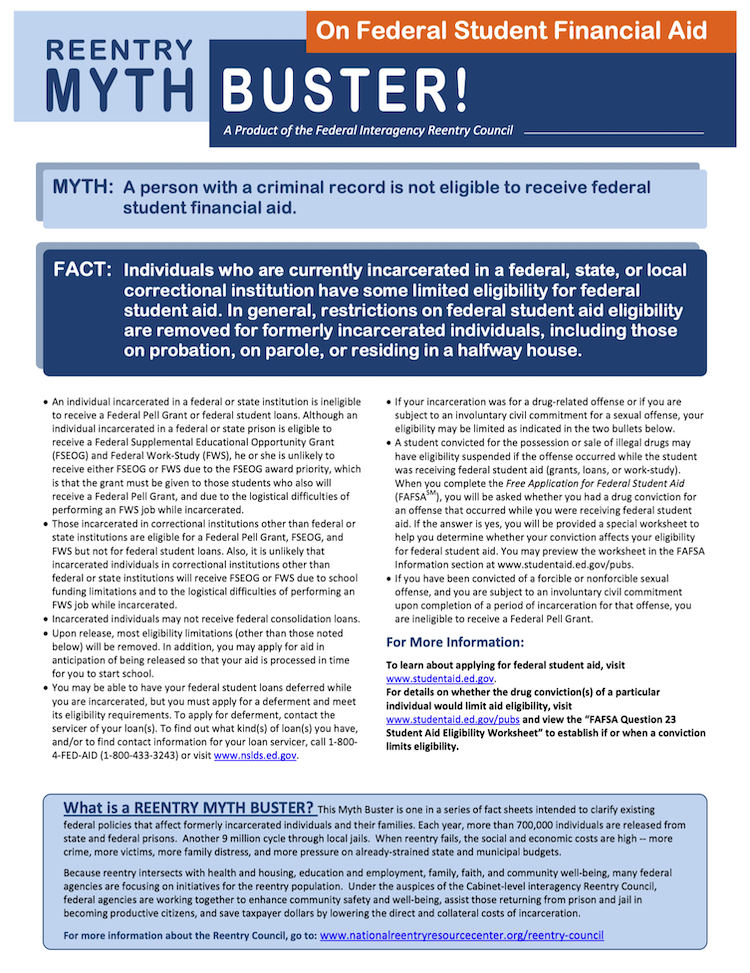 Myth Buster on Federal Student Financial Aid (PDF)
Myth Buster on Federal Student Financial Aid (PDF)
Myth: A person with a criminal record is not eligible to receive federal student financial aid.
Fact: Individuals who are currently incarcerated in a federal, state, or local correctional institution have some limited eligibility for federal student aid. In general, restrictions on federal student aid eligibility are removed for formerly incarcerated individuals, including those on probation, on parole, or residing in a halfway house.
Parental Rights and Family Assistance
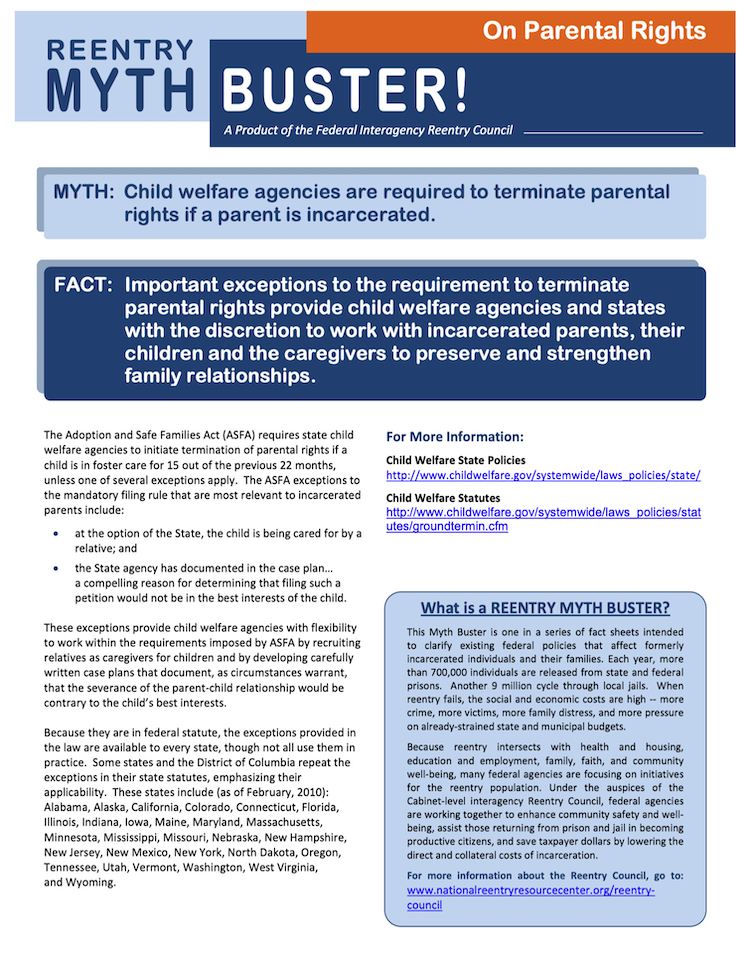 Myth Buster on Parental Rights (PDF)
Myth Buster on Parental Rights (PDF)
Myth: Child welfare agencies are required to terminate parental rights if a parent is incarcerated.
Fact: Important exceptions to the requirement to terminate parental rights provide child welfare agencies and states with the discretion to work with incarcerated parents, their children and the caregivers to preserve and strengthen family relationships.
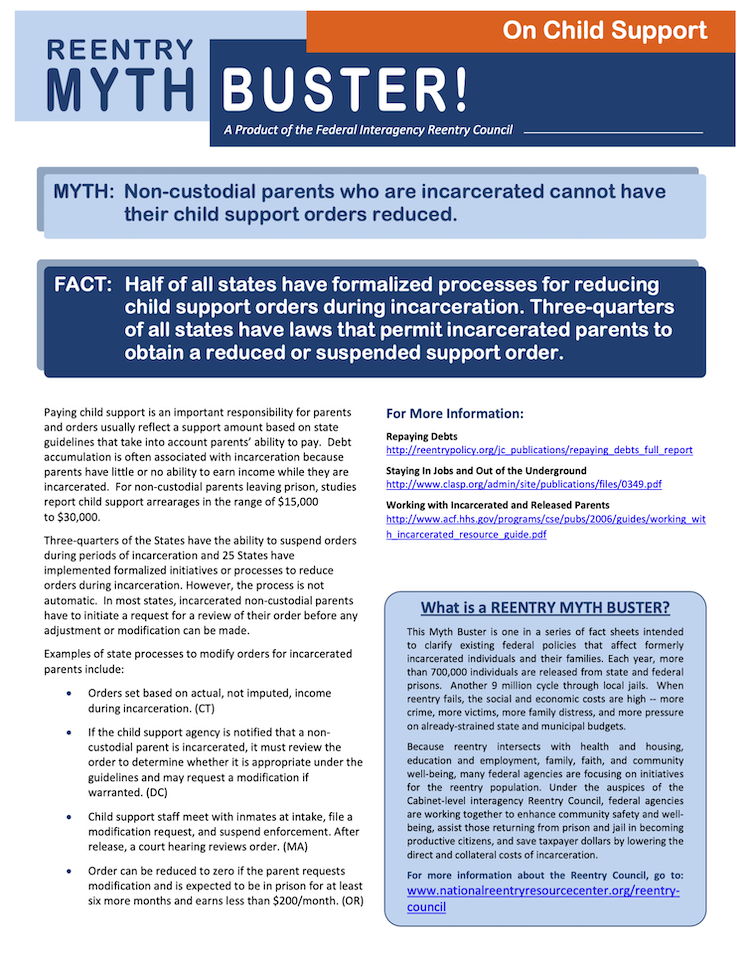 Myth Buster on Child Support (PDF)
Myth Buster on Child Support (PDF)
Myth: Non-custodial parents who are incarcerated cannot have their child support orders reduced.
Fact: Half of all states have formalized processes for reducing child support orders during incarceration. Three-quarters of all states have laws that permit incarcerated parents to obtain a reduced or suspended support order.
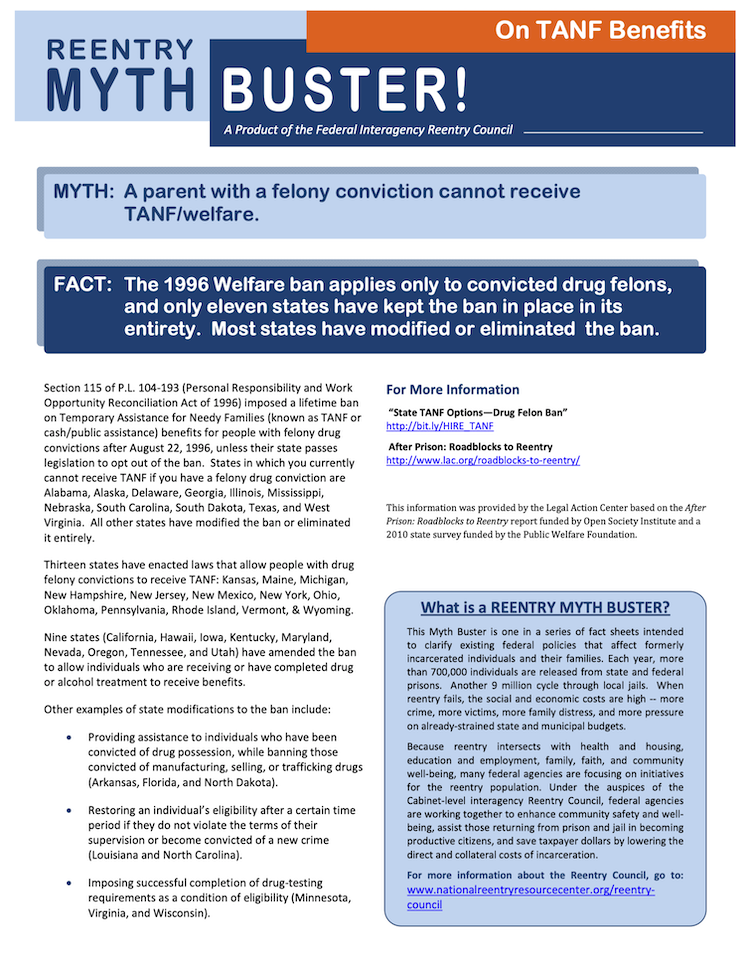 Myth Buster on TANF Benefits (PDF)
Myth Buster on TANF Benefits (PDF)
Myth: A parent with a felony conviction cannot receive TANF/welfare.
Fact: The 1996 Welfare ban applies only to convicted drug felons, and only eleven states have kept the ban in place in its entirety. Most states have modified or eliminated the ban.
Health and Wellness
 Myth Buster on Medicaid Suspension vs. Termination (PDF)
Myth Buster on Medicaid Suspension vs. Termination (PDF)
Myth: Medicaid agencies are required to terminate benefits if an otherwise eligible individual is incarcerated.
Fact: States are not required to terminate eligibility for individuals who are incarcerated based solely on inmate status. States may suspend eligibility during incarceration, enabling an individual to remain enrolled in the state Medicaid program, thereby facilitating access to Medicaid services following release.
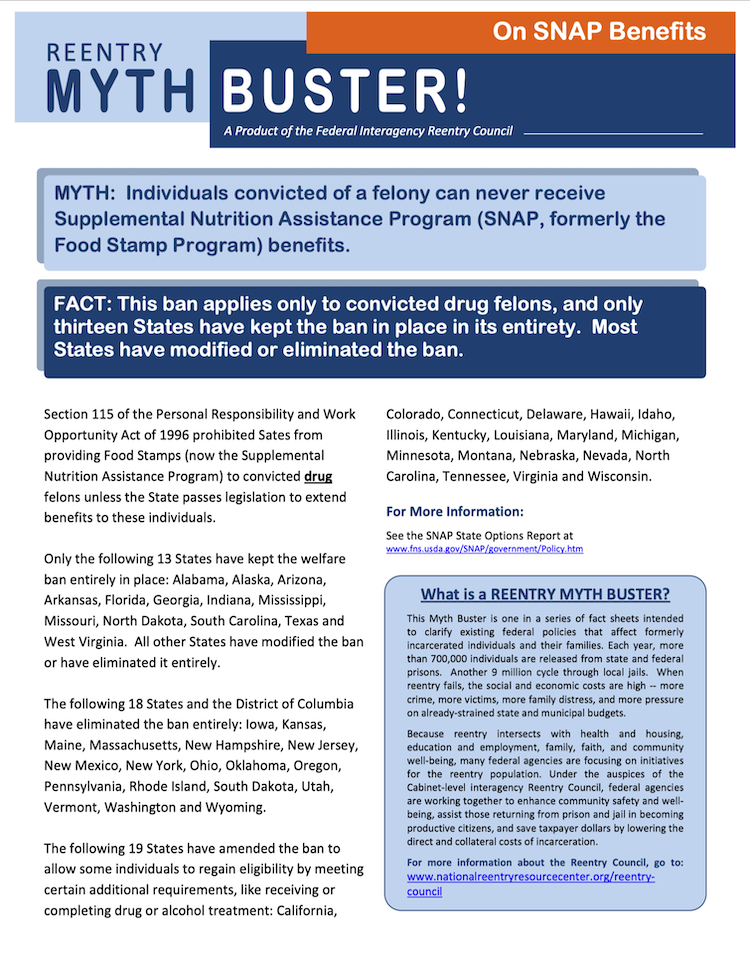 Myth Buster on SNAP Benefits (PDF)
Myth Buster on SNAP Benefits (PDF)
Myth: Individuals convicted of a felony can never receive Supplemental Nutrition Assistance Program (SNAP, formerly the Food Stamp Program) benefits.
Fact: This ban applies only to convicted drug felons, and only thirteen States have kept the ban in place in its entirety. Most States have modified or eliminated the ban.
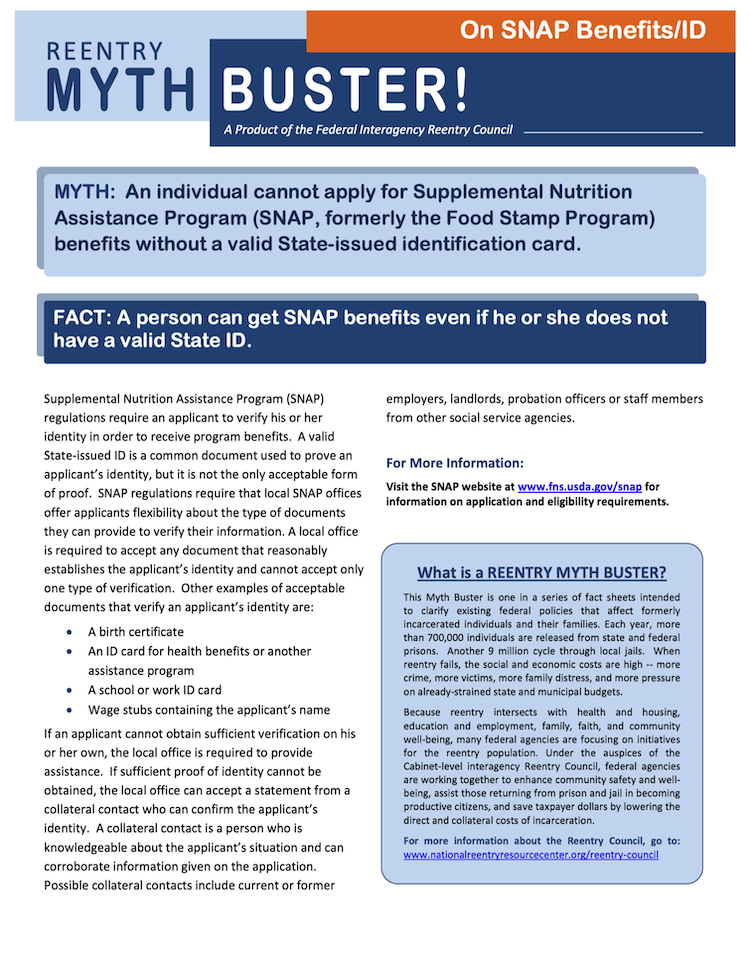 Myth Buster on SNAP Benefits/ID (PDF)
Myth Buster on SNAP Benefits/ID (PDF)
Myth: An individual cannot apply for Supplemental Nutrition Assistance Program (SNAP, formerly the Food Stamp Program) benefits without a valid State-issued identification card.
Fact: A person can get SNAP benefits even if he or she does not have a valid State ID.
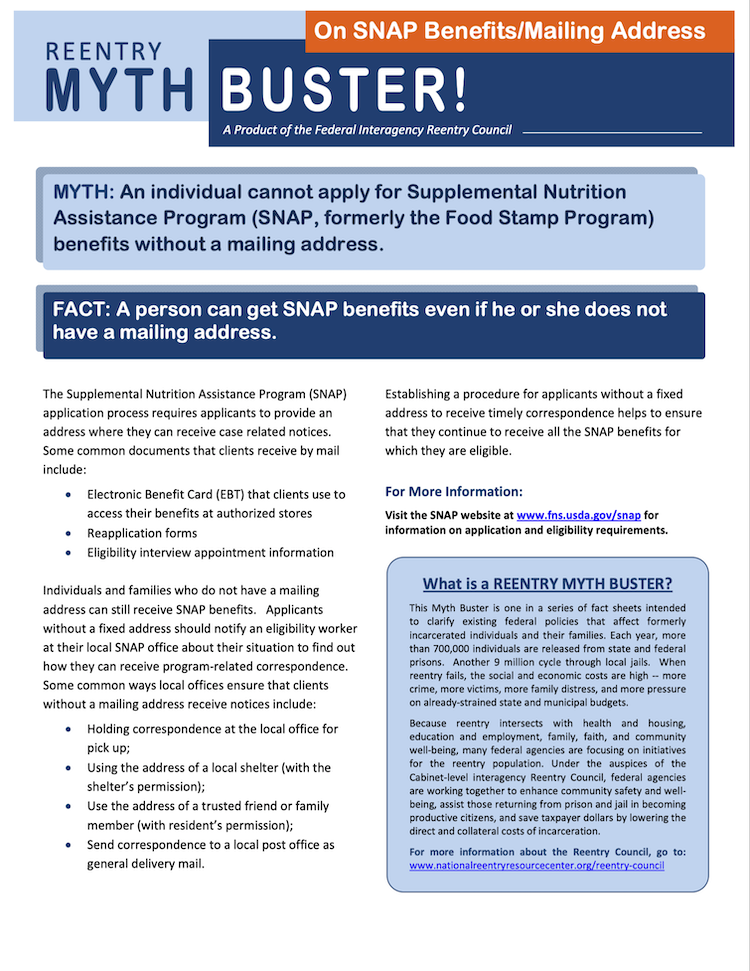 Myth Buster on SNAP Benefits/Mailing Address (PDF)
Myth Buster on SNAP Benefits/Mailing Address (PDF)
Myth: An individual cannot apply for Supplemental Nutrition Assistance Program (SNAP, formerly the Food Stamp Program) benefits without a mailing address.
Fact: A person can get SNAP benefits even if he or she does not have a mailing address.
Veterans
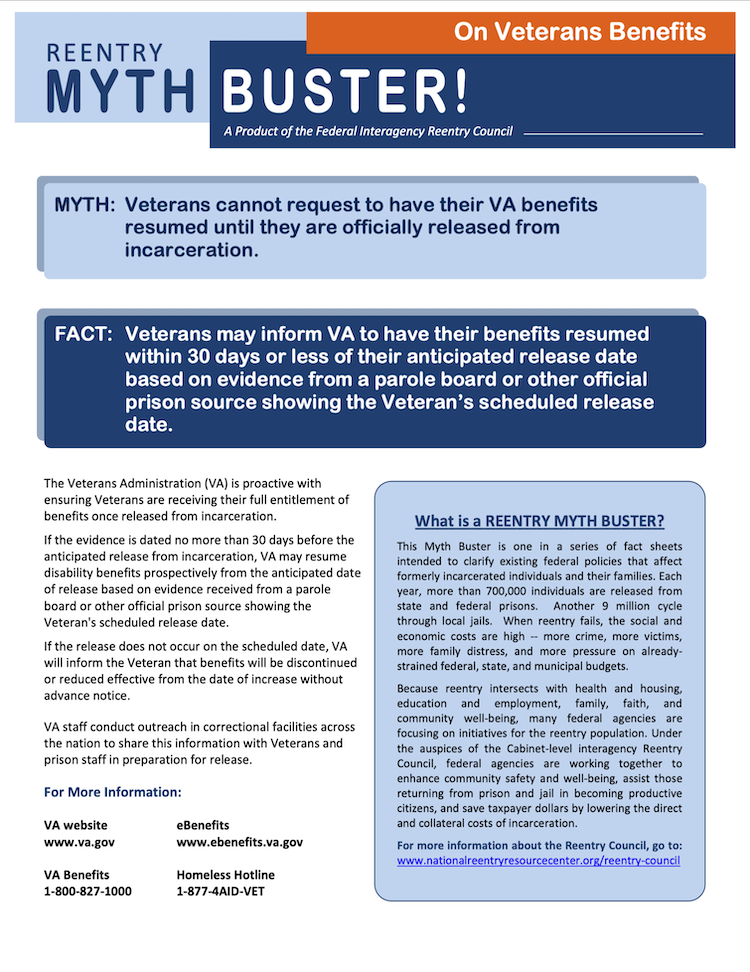 Myth Buster on Veterans Benefits (PDF)
Myth Buster on Veterans Benefits (PDF)
Myth: Veterans cannot request to have their VA benefits resumed until they are officially released from incarceration.
Fact: Veterans may inform VA to have their benefits resumed within 30 days or less of their anticipated release date based on evidence from a parole board or other official prison source showing the Veteran’s scheduled release date.
 Myth Buster on Veterans Health Care (PDF)
Myth Buster on Veterans Health Care (PDF)
Myth: A Veteran with criminal convictions or a history of incarceration is not eligible for VA health care.
Fact: An eligible Veteran, who is not currently incarcerated, can use VA care regardless of any criminal history, including incarceration. Only when an otherwise eligible Veteran is currently incarcerated, or in fugitive felon status, is he or she not able to use VA health care.



